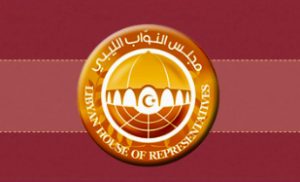By Sami Zaptia.

Tripoli, 16 January 2022:
The House of Representatives announced Thursday that it will hold a formal session tomorrow at its Tobruk headquarters.
The online announcement was signed-off (electronically) by the Speaker of the HoR as opposed to either of his two Deputies.
This suggests that the session will be chaired by permanent Speaker Ageela Saleh. If so, it will mark the official return and would be the first session chaired by Saleh since he took temporary leave last September in order to stand in the planned presidential elections planned for 24 December 2021. The elections did not go ahead.
Analysis: Significance of Saleh’s return – no elections this side of summer?
Stating the now obvious, if Saleh returns to his role as Speaker tomorrow this will confirm that he expects no elections on 24 January or this side of the fasting month of Ramadan (the first of April). Several HoR members had announced that Saleh had returned to his role as Speaker and Saleh had held a number of high-profile meetings recently. But this would be his first chairing of the HoR.
It will be recalled that the election rules prescribe that presidential candidates, which Saleh is, must temporarily give up their other jobs three months before the elections. That is why Saleh left his role as Speaker in September 2021.
If Saleh expects elections to take place within three months (April) he would not return to his post. This suggests that Saleh does not expect elections at best before May.
It is also almost certain that no political entity would suggest holding elections during the holy and fasting month of Ramada. Ramadan ends in May and Eid will take another week. Candidates would expect a minimum of a month of electioneering. All things being equal, this would, at the very best, take us to June/July.
However, all things are not equal, and we can count on the Libyan political elite to continue to disagree – as they have since 2011 – and not agree on the concessions needed for elections to take place by May/June 2022.
HNEC wants changes
Emad Sayeh, the head of the High National Elections Commission (HNEC), wants changes to the election law and a change to the dynamic between HNEC and the judiciary with regards to the disqualification of candidates. This was his reasoning for the failure to hold elections last December. Up to now, the HoR is refusing to change the election law. It is to be seen if now under his chairmanship Saleh will allow the reforming of the election law.
Constitutional basis
The other main prerequisite for elections put forward by the so called ‘‘obstructors’’, such as the High State Council (HSC), is the need to hold a referendum on the draft constitution. The draft constitution is a pandora’s box. The Libyan ethnic Amazigh and Tebu minorities oppose it and boycotted its proceedings. The drafting law says that the constitution must be drafted with their approval. This makes the current draft constitution legally ‘‘unsound’’. Any election based on it would make such an election and anything based upon it very liable to being overturned in the courts.
An indefinite postponement of elections?
Given that Libyans have failed to agree on their social contract since 2011, an attempt to forge a consensus between Libya’s ethnic and political groups before elections is a recipe to postpone the elections for a long period of time – if not indefinitely.
This is a well-known political Libyan fact. That is why those who call for a constitutionally based election are deemed obstructors of elections. They are deemed to be prospering from the current situation and in favour of an indefinite continuation of the status quo. They are the agents against change.
No elections: no stability and no progress
The failure to hold elections and to install new political entities with a renewed legitimacy and mandate means Libya remains in political limbo. It means Libya’s political entities remain weak and unable to implement radical change to the country’s economy and institution.
Nearly eleven years on from the 17 February 2011 Revolution that overthrew the Qaddafi regime, no constitutionally based elections and the continuation of a weak Libyan government leaves Libya continuing to be vulnerable to internal and external forces of instability.







